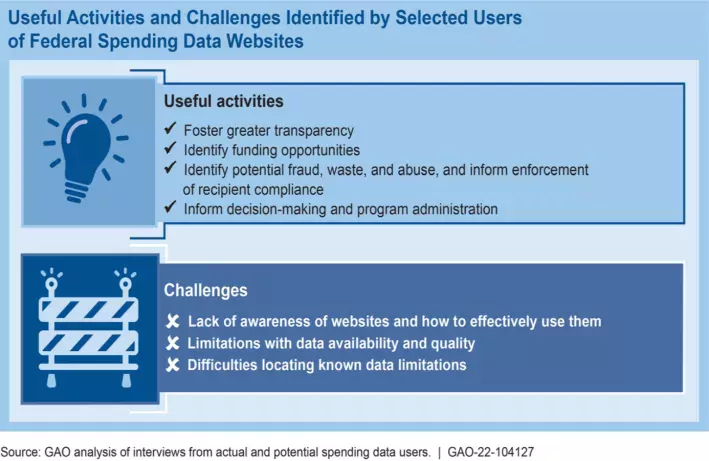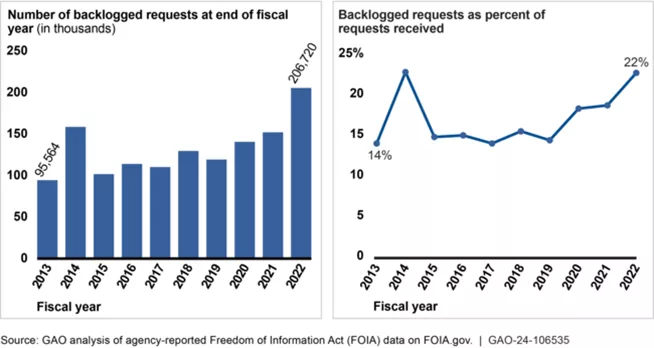Issue Summary
Increasing the availability of federal data can foster accountability and trust by providing the public with information on government activities and their results. In addition, federal decision makers need quality information to assess whether federal programs are working as intended.
Various federal laws and regulations require agencies to make different types of information open and transparent through public websites. But to be useful, this information must be accessible, accurate, and timely (among other things). And federal agencies have faced many challenges that limit the usefulness of such information.
For instance:
- Centralizing data. USAspending.gov integrates data from many sources, including data from agencies’ financial management systems and from government-wide reporting systems. The Office of Management and Budget (OMB) and the Department of the Treasury are responsible for ensuring that the information on this website is consistent, reliable, and accurately displayed. (Increasing the availability and transparency of government data are priority recommendations to OMB.) OMB and Treasury have given agencies guidance to help improve the quality and scope of data, but they should take additional steps to help ensure that this data is clear and accurate. In addition, billions of dollars in federal spending are not reported to USAspending.gov because agencies use different approaches to report other transaction agreements (OTA)—legally binding agreements other than standard contracts and grants that allow for flexible arrangements. Congress should clarify which agencies must submit data, including OTAs, to USAspending.gov.
- Subawards. States and other federal grant recipients can "subaward" some of the money to another recipient to do some of the work. Guidance directs most award recipients to report their subawards for display on USAspending.gov. Having access to quality federal spending data is critical during national emergencies when relief funds are distributed quickly—as during the COVID-19 pandemic. But some grant subaward data on USAspending.gov was incorrect or missing information.
- User feedback. Treasury has collected feedback from site users of USAspending.gov, including through usability testing, and has made changes to the website. It identified different likely users' interests and needs, but could do more to promote the site to them. For example, 92% of federal managers surveyed in 2020 didn't know about this website. Also, some users said it was hard to find what they needed—either specific data or information about the data to help them understand and use it appropriately. For example, Treasury could add a broad website search function to USAspending.gov to help users find content.
Image

- Federal spending data. The DATA Act seeks to improve the transparency of federal spending by expanding on prior legislation to set government-wide data standards, link award spending to programs, and hold agencies accountable for improving the quality of the data. The act also required that each federal agency’s Office of Inspector General (OIG) review and report on the quality of its agency’s spending data. They have done so, and many of these OIGs have made recommendations to improve data quality at their respective agencies. The final reports were due in November 2021, but OIGs continue to identify areas for improvement. By extending the requirement for OIGs to assess the quality of USAspending.gov data, Congress could help ensure that holding agencies accountable and improving the quality of these data remain top priorities.
- Accountability of federal funds. When the COVID-19 pandemic began, federal agencies acted swiftly to establish emergency programs and deliver financial relief to the American people. Many agencies were able to distribute funds quickly, but the tradeoff was that they did not have systems in place to prevent and identify payment errors and fraud. Congress could also take several actions to help increase accountability and transparency of federal spending in both emergency and nonemergency periods, including by clarifying the responsibilities and authorities of OMB and Treasury.
- Data governance. Federal laws and guidance have outlined several actions that agencies can take to implement "data governance"—a framework of organizational structures and supports to help agencies improve the quality and availability of data. Agencies have made progress in establishing data governance to ensure that federal data is consistent and comparable. However, some agencies need to address key milestones to ensure their data quality plans are consistent with OMB guidance, and ensure that their staff has the necessary data literacy and skills.
- Open data. The OPEN Government Data Act requires federal agencies to publish their information as open data (i.e., publicly accessible, machine readable, and free to use, modify, and share), maintain data inventories, and engage with the public about agency data. Many agencies display their data inventories on their websites, but it's unclear how often they update these inventories. This act also requires OMB to issue guidance to agencies to increase public access to data, but OMB has yet to do so.
- Performance information. Performance information can help decision makers understand and improve results at federal agencies. A 2020 survey of federal managers showed that the reported use of performance information in decision-making generally increased across the federal government compared to prior years. However, there are still opportunities to improve the accessibility and completeness of the federal performance data on Performance.gov—including ensuring that this information consistently complies with public reporting requirements.
- FOIA requests. The Freedom of Information Act (FOIA) requires federal agencies to provide public access to government information. Agencies generally must process FOIA requests within 20 working days, but the government-wide backlog of requests grew over the last decade. Agency FOIA officers cited factors such as staffing challenges and complex requests as contributing to backlogs. The Justice Department, which helps agencies administer FOIA, could improve its backlog guidance. For example, it should specify what agencies include in backlog reduction plans—including goals, milestones, and metrics to track progress.
Image




